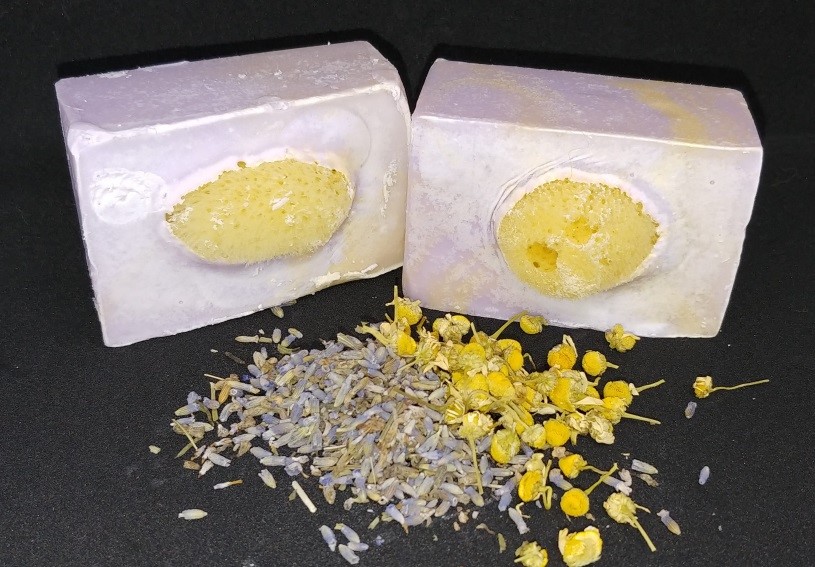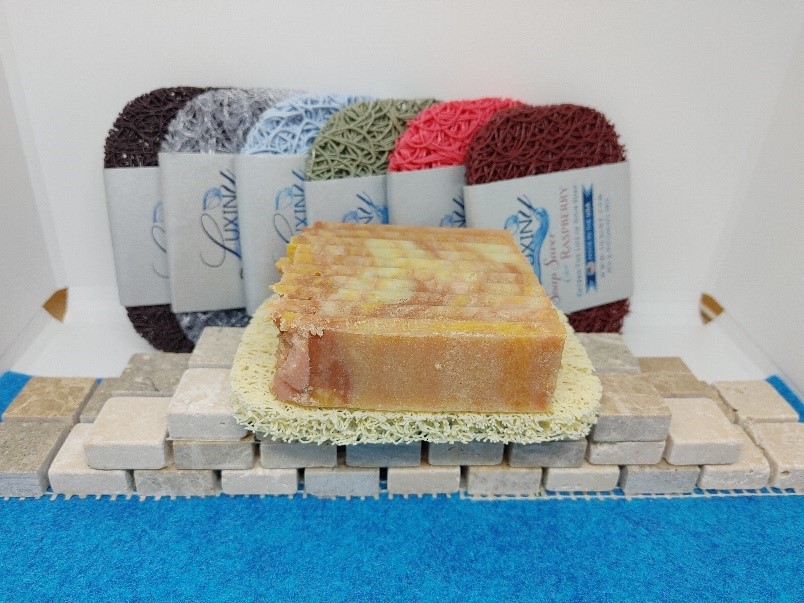What is in handmade lotion that makes it so different from mass produced lotion? Every recipe is different, but today I want to explain why the lotion we make at Barnyard Creations is so great for your skin. I personally have rosacea, and I have to be very careful about what products I put on my skin. After using many different commercial lotions, I finally decided to experiment with making my own products, and I have been absolutely astounded by how much healthier my skin has been. I no longer struggle with facial irritation after using something that flares my rosacea. I have not had a flare since I began using my handmade lotion. I also struggle with dry skin, especially in the winter. Since using my handmade lotion, I have not had chapped skin, even during the harshest winter weather. What is different about this product? To answer this question I thought it best to describe the skin loving benefits of the products I chose to include in my “Ultra-rich Body Lotion”.
Dulce extract
Palmaria palmate is a plant that grows in the Atlantic Ocean as well as the northwest Pacific Ocean and is often dubbed the ‘red seaweed.’ Its scientific name is “Dulse” (pronounced dullis). Dulse is used for its natural antioxidant properties and abundance of vitamins B6, B12, C, E, and A. Palmaria palmata helps turn back the clock on your skin in many ways. First, it helps to improve blood and lymph circulation to promote brighter skin. Second, it provides antioxidant support to neutralize damaging free radicals (unstable molecules that can damage the cells in your body). Third, palmaria palmata contains seawater which helps to detoxify and cleanse the skin. Last but certainly not least, it contains amino acids and vitamins that can help promote collagen production.
Evening Primrose extract
Evening Primrose Extract has long been known as a natural anti-inflammatory. Evening Primrose extract has traditionally been used in mature skin preparations, but is also wonderful to soothe skin dryness, itchiness, and redness. It’s commonly found in mature skin preparations because of its moisturizing and nourishing properties.
Mallow extract
Mallow was cherished by the Ancient Romans for its soothing and protecting properties for dry and sensitive skin. It is commonly used in skincare preparations to reduce inflammation. The roots of the marshmallow plant contain a thick, gummy substance called mucilage. The mucilage is extracted from the root and used for medicinal purposes. The root extract also contains a number of other ingredients that promote skin health, such as polysaccharides and flavonoids. Mallow extract possesses antimicrobial, anti-inflammatory properties, and can improve the function of the immune system.
Babassu oil
This non-greasy oil can moisturize the skin and keep it hydrated, especially oily and dry skin types. It is easily absorbed by the skin, making it soft and smooth. The oil, when applied on the skin, balances the natural oils of the skin. If you suffer from psoriasis, eczema, rosacea or even acne, using moderate amounts of babassu oil is an excellent idea. Unlike coconut oil, babassu oil absorbs into the skin much more rapidly, and leaves behind less of an oily residue. Babassu oil is filled with antioxidants, such as Vitamin E and phytosterols. These antioxidants are known to combat inflammation very effectively.
Grapeseed oil
Grapeseed oil comes from the pressed seeds of grapes. The oil is a by-product of the process of making wine. This oil is known for its anti-inflammatory, antimicrobial, and anti-oxidant properties. These properties, along with the high amounts of omega chain fatty acids and vitamin E contained in grapeseed oil, have made it a popular topical treatment for skin. The powerful antioxidants in grapeseed oil have another benefit; grapeseed oil may help to protect your skin from absorbing the full damage of UV rays.
Jojoba oil
Jojoba oil has anti-inflammatory properties which may help skin irritation, reduce redness caused by drying, ease the effects of eczema and rosacea, and keep skin calm. The Vitamin E and B-complex vitamins in the Jojoba oil help in skin repair. Jojoba Oil is referred to as “oil” but it is, in fact, a liquid wax. The wax structure of jojoba oil is very similar to the natural oils of our skin, which means it not only moisturizes, but absorbs faster than other oils. Jojoba is full of nutrients and antioxidants, and is suitable for all skin types.
Meadowfoam oil
The composition of naturally occurring fatty acids in Meadowfoam oil gives it a unique, non-greasy feel that works as an excellent moisturizer. Meadowfoam oil is thick enough that it is able to form a barrier across the skin to lock in moisture and provide UV protection properties. Meadowfoam is a very earth-friendly product. The Meadowfoam plant is a sustainable and renewable resource. Meadowfoam oil drastically increases the moisturizing effects of any lotion or cream. Its unmatched stability also makes it useful in extending the shelf life of other oils. Meadowfoam oil is not only a super-moisturizer, but it is also high in antioxidants and a variety of other nutrients.
Rosehip seed oil
Rosehip oil is a pure plant oil, which is similar in design to our own natural skin oil (sebum). This means it is a very light, dry oil that is readily absorbed by the skin while helping to promote normal, healthy cell function. Rich in Vitamin A, which is known to help fight against age spots and wrinkles, rosehip oil is great for anti-aging. It’s also packed with molecules that are small enough to penetrate deep layers of the skin, improving moisture and collagen levels, reducing wrinkles and fine lines. Rosehip oil is rich in essential fatty acids and antioxidants, which are essential for tissue and cell regeneration in the skin.
A note about Parabens…..
There is an overwhelming amount of information that refutes the war cry against Parabens, but once that bell was rung there is no silencing the ripple effect caused by the scare. Many manufacturers removed Parabens from products in response to the fear caused by the early Paraben reports. It is important to note that The American Cancer Society, The National Cancer Institute, and the FDA (the FDA has a page dedicated to Parabens) have all come out to say that there is no proof that Parabens cause cancer. Unfortunately, many critics will say that the industry is tainted. Most companies have moved away from Parabens but many refuse to because putting out a “Paraben-free” product means that they agree with the bad science.
I use a Paraben and formaldehyde free preservative in my oil based products, because there are effective products available that do not contain Parabens. However, for water based products there are not equally effective products available. Most natural products or Paraben free products have a very short shelf life, and the products must be destroyed after about 6 months. Paraben based products provide a much longer shelf life and significantly reduce the risk of bacteria development. I choose to use Gemaben II, which is a Paraben based product. The amount of Paraben used is so small that you have a negligible amount of Paraben on the skin each time you use the product. And, even with cumulative use the amounts of exposure are insignificant compared with the levels of Paraben studied. I have had no rosacea exacerbations or skin irritation as a result of using these products.
You must choose what you feel is best for yourself and your family. However, I would encourage you to review the available research before choosing a Paraben free product simply because of the scare messages and bad science.



